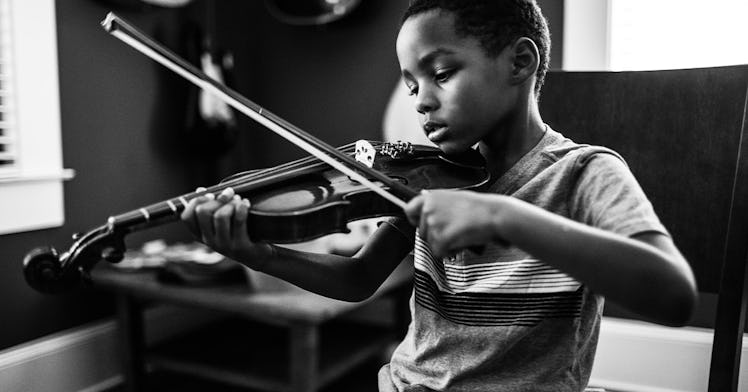How To Tell If Your Kid Is A Prodigy (And Why It’s Probably Better If They’re Not)
Do you want to talk about quantum theory all day?

Of course your precious sunflower is special, because you are an excellent parent. Without you, there’s no way little Johnny could repeat key punchlines from Ghostbusters or identify the starting point guard on your preferred squad of ballers.
But while those things undoubtedly matter — seriously, people, Ghostbusters — there’s a difference between special and “special.” By age 8, Mozart composed his first symphony and mathemagenius Terence Tao scored a 760 on the math portion of the SAT. These are examples of genuine child prodigies, the kind making the 6 o’clock news or attending medical school before puberty. And, if you have to ask if your kid is a prodigy, they aren’t.
“You will totally know it,” says Dr. Ellen Winner, professor of psychology at Boston College.
“One in 5 million children might be a prodigy, says Dr. Joanne Ruthsatz of Ohio State University.
Drs. Winner and Ruthsatz are two of the world’s leading experts on prodigies (prodigy-ologists?); Dr. Winner runs a Harvard lab focused on gifted children and Dr. Ruthsatz is at the forefront of research into the nexus of exceptional childhood behavior and autism. So, they know what they’re talking about. But for those holding out hope — or wondering what to do with a kid drawing like Rembrandt in elementary school art class — here’s how to identify and nurture a child prodigy.
What Is a Prodigy?
“A prodigy is somebody who is on the extreme end of giftedness. They tend to be very advanced in one area, usually not all areas,” Dr. Winner says. “These are kids who are years ahead of their peers.” Typically, child prodigies emerge in math, language, art, and music. Some might include chess, or even sports. Signs of prodigy-hood can be seen as young as 2 or 3-years-old.
Clinically, some say a true prodigy is someone who achieves professional mastery of a skill by age 10. Others extend that timeline to adolescence. But while there is at least a little wiggle room on where “really, really, really gifted” ends and “prodigy” begins, one thing all prodigies share is a total focus on the area in which they excel.
“They’re unusual in their devotion to their particular domain. Most of them are only interested in that domain,” says Ruthsatz. Winner describes it as “a rage to master.” That behavior, along with the talent, is critical to identifying prodigies.
Note to parents of non-prodigies (so, most of you): No amount of flash cards, professional training, or baby Einstein DVD’s can make your kid a prodigy if the stuff isn’t there, so don’t try. It will just make both of you miserable.
Ok, You Beat The Odds; What Do You Do With Your Prodigy?
For starters, don’t fight it. “Do not try to say, “Be normal like the other kids,” says Winner. “Do not try to make your child well-rounded. Realize your child is not like other kids.”
From there, feed the talent as best you can. Don’t discourage the obsessiveness, because engaging in the area of prodigy-ness is what will make your kid happy. Take an art prodigy to museums, and provide good papers, pencils, crayons, and other art supplies. If your 6-year-old is a tiny Pascal (himself a child prodigy), and you can’t math your way out of a paper bag, find a graduate student to help engage and tutor with puzzles, problems, and whatever else stimulates little number geniuses. Let music prodigies play their instruments, and if the constant practicing is too much, invest in a pair of good noise-canceling headphones or soundproofing for their room.
Just be prepared to invest time and energy, and probably some money, too.
Socialization is a challenge, as well. Because prodigies tend to sound like tiny grown ups, they do better in rooms filled with adults than peers. “Not many kindergartners want to talk about black holes or theories of evolution,” Ruthsatz notes. Do what you can to find a fellow prodigy with whom your kid can find common understanding. Ideally, it would be in your child’s area of expertise, but it doesn’t have to be. Prodigies with different skill sets can still identify with the feelings of difference relative to other kids. But even one friend who “gets it” can make a huge difference in overall happiness.
And, For The Rest Of You, A Silver Lining
You probably don’t want a prodigy, anyway. Not that the child’s gifts can’t be rewarding, but parenting a prodigy isn’t easy. Nor is being one.
“Your kid doesn’t fit in. He’s totally different from the other kids. He’s also not happy, because they can’t find others like themselves, especially when they get to school,” Winner says. “Schools are not going to be set up for them, because they’re set up for the more typical child. It has a lot of rewards, but it’s stressful.”
Keeping up with “normal” kids is hard enough, but the unique focus and drive of child prodigies adds another layer of difficulty. “Most prodigy parents are just hanging on by their teeth trying to satisfy their child’s innate curiosity about a subject,” says Dr. Ruthsatz.
In the end, there’s something to be said for having a good, old-fashioned, highly gifted kid.
“Usually kids who are high achieving, but not prodigies, will have a whole spectrum of things they’re interested in doing. They’ll do this, then switch to that. They’ll grow up more normally as far as being less obsessive, less attention to detail in a particular domain,” Ruthsatz says.
That’s to say, they’re more likely to grow into young adults who you can be proud of, instead of young adults who make you feel a little inadequate every day, which sounds like a much better way to go. You already have a spouse to make you feel inadequate, right?
This article was originally published on